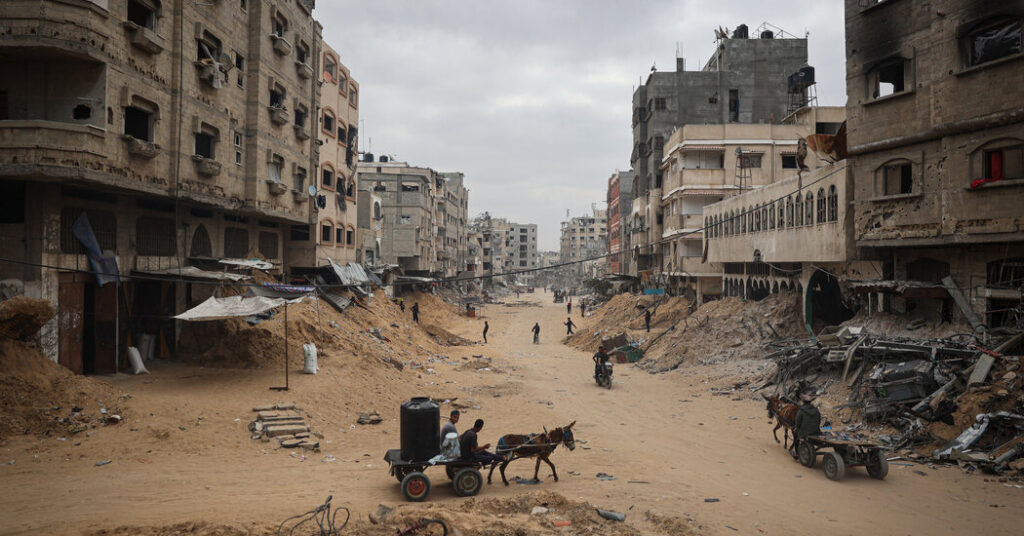In Jerusalem, Washington and elsewhere, eyes are on Hamas as officials await how the group will respond to a U.S.-Israeli-backed ceasefire proposal in the Gaza Strip.
The proposal includes the release of hostages held by Hamas and Palestinian prisoners in Israel and the return of civilians to sparsely populated northern Gaza after nearly seven months of devastating war; it would also increase aid to the territory .
“Our position on the current negotiating document is negative,” Hamas spokesman Osama Hamdan said on Wednesday.
But the Hamas press office later said his comments in an interview with Al Manar, a Lebanese television channel owned by Hamas ally Hezbollah, were not an outright rejection. The office said some changes would need to be made to get Hamas to agree, but did not specify what they would be but noted that negotiations would continue.
Secretary of State Antony Blinken made clear Hamas had a responsibility to accept the offer during a visit to Israel on Wednesday. “We are determined to achieve a ceasefire and get the hostages home, and do it now, and the only reason why we can’t do that is Hamas,” he said.
However, Israeli opposition leader Yair Lapid said Prime Minister Benjamin Netanyahu had “no political excuse” not to reach a deal soon.
Complex negotiations have dragged on for months, with elements of each negotiation changing and several others changing as well. To further complicate matters, Israel and the United States do not talk directly to Hamas, which they consider a terrorist organization, but instead communicate through Qatari and Egyptian officials who act as intermediaries.
One seemingly intractable sticking point is Israel’s planned ground offensive against Gaza’s southernmost city of Rafah, where about a million people have been taking refuge after being displaced from their homes elsewhere in the region.
“If the enemy carries out Operation Rafah, negotiations will stop,” Mr Hamdan told Mannar on Wednesday. “The resistance will not negotiate under fire.”
The Biden administration has pressured the Israeli government to abandon the idea of large-scale incursions into cities and instead rely on surgical operations to kill or capture Hamas leaders and fighters.
But Israeli officials have consistently stressed that the attack will happen. Far-right parties in Netanyahu’s coalition have signaled they will withdraw from the coalition if he calls off the offensive, which could bring about the collapse of the government and force new elections.
“With or without a deal, we will enter Rafah and eliminate the Hamas camp there to achieve total victory,” Netanyahu said in a statement released on Tuesday.
Hamas insists that any agreement would be a permanent ceasefire rather than a temporary cessation of fighting – a position that Israel rejects as Hamas bids for time to reassert itself as a governing and military force. The Biden administration hopes a six-week pause in the war could be the first step toward a lasting end to the fighting.
Israel softened some of its stance this week. It agreed to allow Palestinians to return en masse to northern Gaza during the first phase of the ceasefire. Israel has previously insisted on screening returnees and restricting their movement.
One Israeli official said there would be no checks or restrictions on people returning to the north, while another said there would be few if any restrictions, without elaborating. The officials spoke on condition of anonymity to share details of the proposal.
Israel also dropped its demand for Hamas to release 40 hostages, including female civilians and soldiers, as well as sick or elderly people, after Hamas said none of the 40 hostages were alive. The latest proposal lowers that number to 33.
According to the Israeli government, some 250 people were abducted and taken to Gaza during the October 7 Hamas-led attack on Israel. More than 100 people were released during a week-long ceasefire in November, and Israeli officials said they believed more than 30 people, possibly more, died.
Israel said the Oct. 7 attack killed about 1,200 people. Gaza health officials say subsequent Israeli bombing and incursions have killed more than 34,000 people and injured far more. According to the United Nations, most of Gaza’s roughly 2.3 million people have been displaced and more than 1 million people are suffering from catastrophic food insecurity.

